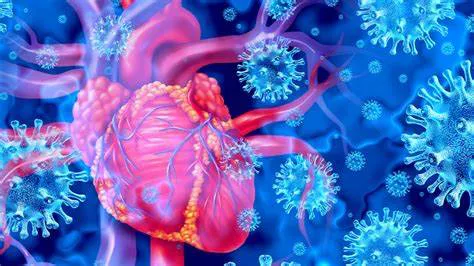In recent times, the Omicron variant of the COVID-19 virus has been a topic of intense discussion and research. Among the various concerns raised by this variant, there have been questions about its potential to cause myocarditis, a condition characterized by inflammation of the heart muscle. This article delves into the current understanding of whether Omicron can indeed lead to myocarditis, exploring the available evidence, risk factors, symptoms, diagnosis, and treatment options.
Understanding Myocarditis:
Before delving into the specific relationship between Omicron and myocarditis, it’s crucial to understand what myocarditis is and how it typically occurs. Myocarditis refers to inflammation of the heart muscle, which can result from various causes, including viral infections, autoimmune reactions, and certain medications. When the heart muscle becomes inflamed, it can affect the heart’s ability to pump blood effectively, leading to symptoms such as chest pain, shortness of breath, fatigue, and in severe cases, heart failure.
The Omicron Variant:
The Omicron variant of the COVID-19 virus gained widespread attention due to its rapid spread and distinctive mutations. Initially identified in late 2021, Omicron exhibited a higher rate of transmission compared to earlier variants, leading to concerns about its impact on public health systems and the severity of illness it could cause. As researchers and healthcare professionals studied Omicron, they also investigated its potential to cause complications such as myocarditis.
Evidence and Research:
Studies examining the link between Omicron and myocarditis are ongoing, and current data provide some insights into this relationship. While earlier variants of the COVID-19 virus, such as Delta, were associated with an increased risk of myocarditis, particularly in younger individuals who contracted the virus, the evidence regarding Omicron’s specific impact on myocarditis is still evolving.
Initial reports suggested that Omicron might be associated with milder symptoms and lower rates of severe illness compared to previous variants. However, it’s essential to note that even milder cases of COVID-19 can lead to complications such as myocarditis, especially in individuals with pre-existing cardiovascular conditions or other risk factors.
Risk Factors for Myocarditis:
Several factors can contribute to an individual’s risk of developing myocarditis, regardless of the viral variant causing the infection. These risk factors include:
1. Pre-existing Heart Conditions: Individuals with a history of heart disease, including coronary artery disease, heart failure, or previous episodes of myocarditis, may be at higher risk.
2. Age: Myocarditis can occur at any age, but certain age groups, such as younger adults and adolescents, may be more susceptible.
3. Viral Load and Immune Response: The severity of myocarditis can be influenced by the viral load (the amount of virus in the body) and the body’s immune response to the infection.
4. Genetic Factors: Some genetic factors may predispose individuals to a higher risk of developing myocarditis in response to viral infections.
Symptoms of Myocarditis:
The symptoms of myocarditis can vary widely and may mimic those of other heart conditions or respiratory illnesses. Common symptoms include:
1. Chest Pain: This can range from mild discomfort to severe, sharp pain.
Shortness of Breath: Difficulty breathing, especially during physical activity or lying flat.
2. Fatigue: Feeling unusually tired or lacking energy, even with adequate rest.
3. Palpitations: Sensations of rapid, irregular, or pounding heartbeats.
4. Swelling: Fluid retention leading to swelling in the legs, ankles, or abdomen.
5. Fever: Elevated body temperature, which may accompany other flu-like symptoms.
It’s important to note that some individuals with myocarditis may not experience any symptoms, especially in milder cases. However, the condition can still lead to long-term complications if left untreated.
Diagnosis and Treatment:
Diagnosing myocarditis typically involves a combination of medical history review, physical examination, imaging tests (such as echocardiography and cardiac MRI), blood tests (to check for markers of inflammation and heart damage), and sometimes, a heart biopsy in severe cases.
Treatment for myocarditis aims to reduce inflammation, manage symptoms, and address any underlying causes or complications. This may include:
1. Medications: Anti-inflammatory drugs, such as nonsteroidal anti-inflammatory drugs (NSAIDs) or corticosteroids, may be prescribed to reduce inflammation.
2. Heart Medications: Medications to support heart function, control blood pressure, or manage arrhythmias (irregular heartbeats) may be necessary.
3. Lifestyle Changes: Adopting a heart-healthy lifestyle, including regular exercise, a balanced diet, and smoking cessation, can help manage the condition.
4. Monitoring: Regular follow-up appointments and monitoring of heart function are essential to track progress and detect any changes or complications early.
In severe cases of myocarditis, advanced treatments such as mechanical circulatory support (e.g., ventricular assist devices) or heart transplantation may be considered.
Conclusion:
While the specific relationship between the Omicron variant and myocarditis is still being studied, it’s crucial for individuals to be aware of the potential risks associated with COVID-19 infections, including complications like myocarditis. Maintaining good overall health, staying informed about vaccination recommendations, and seeking prompt medical attention for any concerning symptoms can help mitigate the risk of myocarditis and other COVID-19-related complications. Ongoing research and public health efforts are essential in understanding and addressing the impact of viral variants on cardiovascular health.

